Iran Denies Involvement In Attacks On Red Sea Vessels
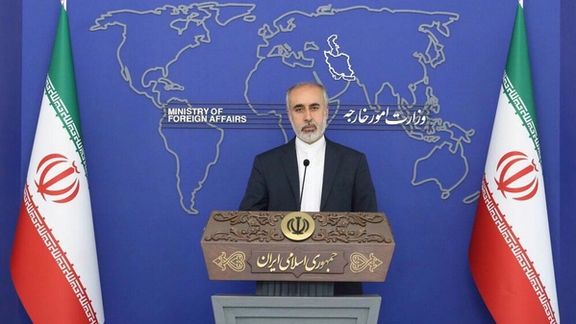
Iran has denied involvement in the recent attacks on vessels in the Red Sea, while its proxy, the Houthi rebels, claimed responsibility.

Iran has denied involvement in the recent attacks on vessels in the Red Sea, while its proxy, the Houthi rebels, claimed responsibility.
The Houthis are one of several Iran-backed militant groups in the Middle East. They have been effectively in a state of war with Saudi Arabia since 2015 and have claimed support for Palestinians since the Hamas terror attack on Israel on October 7.
The British government has attributed the drone and missile attacks on commercial ships in the Red Sea to Iran, but Nasser Kanaani, the spokesperson for the Ministry of Foreign Affairs said Tuesday "As we have clearly stated before, resistance groups are not taking orders from Tehran to confront the war crimes and genocide committed by Israel."
The United States, on the other hand, has also placed blame on Iran for a series of attacks in Middle Eastern waters by Houthis. Jake Sullivan, the US national security adviser, asserted in a Monday briefing with reporters that there is "every reason to believe that the attacks, while launched by the Houthis in Yemen, are fully enabled by Iran."
Recently, the Houthis confirmed launching drone and missile attacks on what they claimed were two Israeli vessels, Unity Explorer and Number 9. The attacks, according to the Houthis, were carried out "in response to the Yemeni people's demand and Muslim states' calls to stand with the Palestinian people."
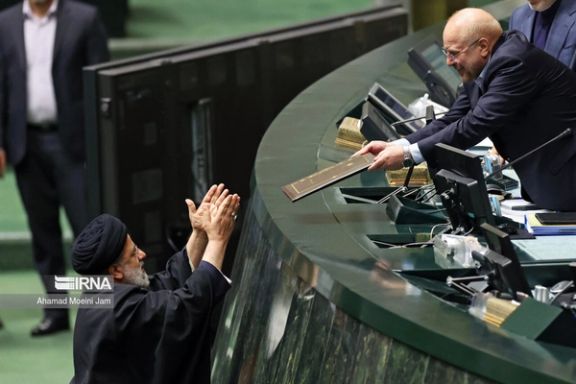
Iranian President Ebrahim Raisi presented the proposed budget for the upcoming year to parliament on Tuesday for a nation amidst an economic crisis.
Despite his claims of a four percent economic growth, observers note a lack of visible signs of development, coupled with high inflation and the depreciation of the national currency.
Defending the budget proposal, President Raisi said efforts were made to "realistically depict both revenues and expenditures." Addressing the parliament, he asserted that his government had experienced a four percent economic growth since taking office, following a decade of economic stagnation. However, his assertions are currently not subject to independent verification due to constraints on government agencies and a lack of transparent quarterly statistics.
Raisi acknowledged a budget deficit of approximately ten billion dollars but claimed that it had been compensated through income generation. Despite facing economic challenges, he expressed the government's commitment to avoiding a budget deficit in the current year.
There are no visible signs of economic development in Iran with international sanctions for the country's nuclear program, its brutal suppression of protests and its support of Russia's war on Ukraine significantly restricting trade, foreign investment, and access to financial markets.
High inflation rates further compound the economic woes, eroding the purchasing power of the local currency. This economic scenario poses challenges for businesses and individuals, impacting living standards and contributing to economic stagnation.
The proposed budget, presented to the parliament, revealed some key details, including tax revenues expected to be twice the government's oil revenues.
Last month, the Entekhab news website in Tehran reported that according to the budget bill, even the monthly incomes of 100 to 140 million rials ($200 to $280) will be subject to a 10 percent tax. Jahan-e-Sanat daily also warned that the Iranian government has counted on “inflation tax” to fill the next year’s budget. The Iranian calendar and fiscal year begins on March 21, 2024.
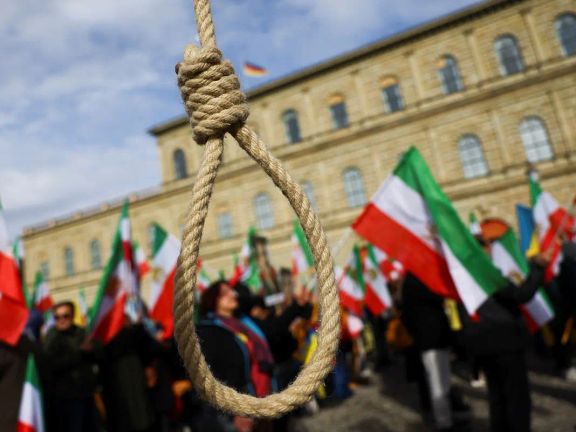
Five prominent French labor unions have condemned the increasing wave of executions in Iran.
In a joint declaration released on Monday, the French Democratic Confederation of Labor (CFDT), General Confederation of Labor (CGT), Unitary Trade Union Federation (FSU), Solidarity trade union, and National Union of Autonomous Trade Unions (UNSA) accused the Iranian government of exploiting global attention on the ongoing conflict in Gaza to intensify its oppressive measures.
The declaration highlighted Iran's response to growing social and popular anger, particularly related to the economic crisis, by escalating repression. This comes amidst authorities increasing arrests of worker activists under false pretexts and targeting individuals who have organized peaceful demonstrations against the high cost of living and salary arrears.
The syndicates emphasized that repression extends beyond worker activists, impacting those expressing opinions contrary to the regime's beliefs, including lawyers, women's rights advocates, and human rights defenders.
Underlining the disproportionate impact on women who have come under increasing pressures to abide by mandatory dress codes and have witnessed state-sanctioned sexual violence in detentions as documented by Iran's Me Too movement, they stated, "Women are the first victims of the authoritarian and patriarchal regime."
The government's heightened execution rates, particularly public ones, were slammed as an attempt to instill fear in the population, putting to death at least 419 people in the first seven months of the year, a rise of 30% since the same period last year, according to the UN.
In a call for international solidarity, they urged all organizations and individuals defending human and workers' rights to protest against the Iranian authorities. Their demands include the abolition of the death penalty, annulment of unjust convictions contrary to fundamental freedoms, and the immediate and unconditional release of activists imprisoned for their opinions or union and association activities, as well as foreign citizens.
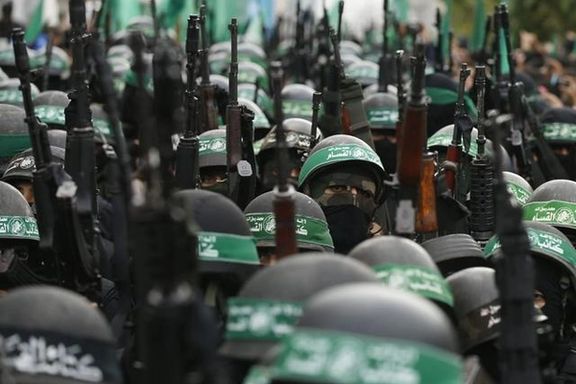
You don’t find many saying it loud, but Hamas might not be eradicated unless its military wing the Qassam Brigades is completely dismantled.
What Is Izz Ad-Din Al-Qassam Brigades?
In the emblem of the Izz ad-Din al-Qassam Brigades, a Hamas-style soldier is depicted, holding a rifle in one hand and the Quran in the other looking toward the Dome of the Rock. The flag next to the soldier reads "There is no God but Allah" accompanied by a Quranic verse positioned at the top of the emblem: "Therefore, you did not slay them, but Allah slew them."
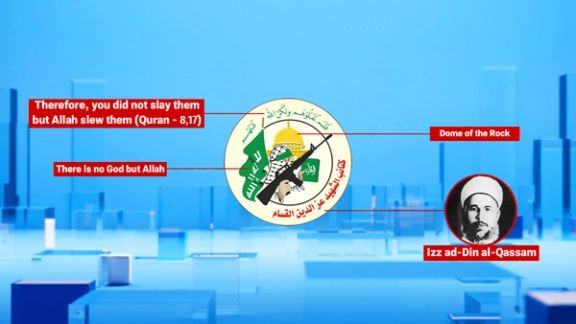
The name is derived from Izz ad-Din al-Qassam, a cleric born in Syria and killed in Palestine either in a shootout with British forces in 1935 or was captured in November 1937 and executed by the British. Different sources offer the two versions of history. Qassam viewed Islam as a tool for resistance against Western colonization. He formed a military group to engage in jihad and combat against the British and Jews.
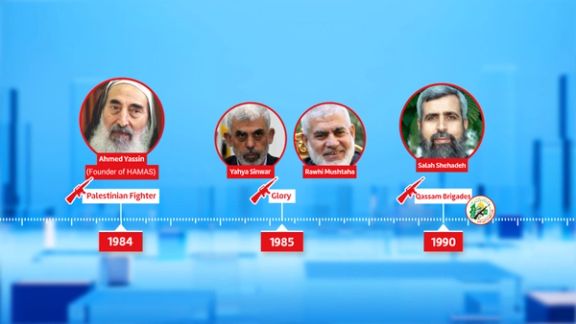
Embryonic Phase
The formation of the Qassam Brigades dates to 1984 when Ahmed Yassin, the founder of Hamas, established a small group called the Mujahidoun al-Flistinion (The Palestinian Fighter). The group's activities were exposed, leading to Yassin's arrest and a 15-year prison sentence. Just 11 months later, Yassin was released in a prisoner exchange and founded another armed organization called al-Majd (Glory) . The leaders of al-Majd were Yahya Sinwar, now a celebrity and on the top op Israel’s wanted list, and Rawhi Mushtaha. On February 16, 1989, Hamas forces abducted an Israeli soldier. Clues once again led to Sheikh Yassin, resulting in his return to prison. While Yassin was in prison, the new military organization of Hamas, Izz ad-Din al-Qassam, was set up in 1990, the initial cell was established in the Rafah, Gaza Strip. Its first commander was Salah Shehadeh, a holder of a brown belt in Japanese wrestling.
Many attribute the founding of the military wing of Hamas in the West Bank to Saleh al-Arouri, who currently resides in Lebanon. The initial military cell of Izz ad-Din al-Qassam in the West Bank was shaped under the leadership of Mohammad Abu Tir, once recognized for his distinctive ginger beard. The real powerhouse of Hamas' military muscle though is all happening down in the Gaza Strip.
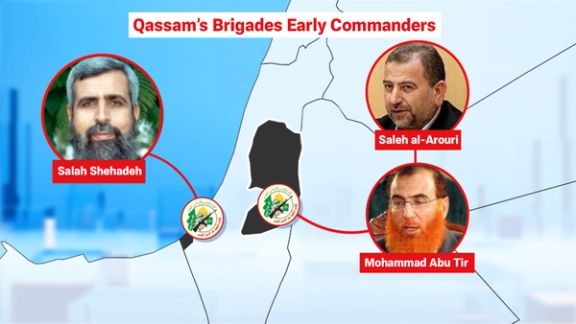
Mohammed Deif; The Mastermind In The Shadows
The top operator leading the Qassam Brigades is none other than Mohammed Deif, right up there on Israel's most-wanted list. For his own security he's never caught snoozing in one spot for more than a night, hence his alias "Deif" or "Guest." When Salah Shehadeh got taken out by Israel, Deif stepped up to be the position of commander. Despite numerous attempts to knock him off, he's said to be still around and operating as an elusive figure. Reportedly after Israeli airstrikes in Gaza, he is in a wheelchair and has lost an eye. Some even reckon that if he's still alive, spotting him is like finding a needle in a haystack. He is said to be the mastermind behind Hamas' operations and the architect of the intricate tunnel network beneath the Gaza Strip.
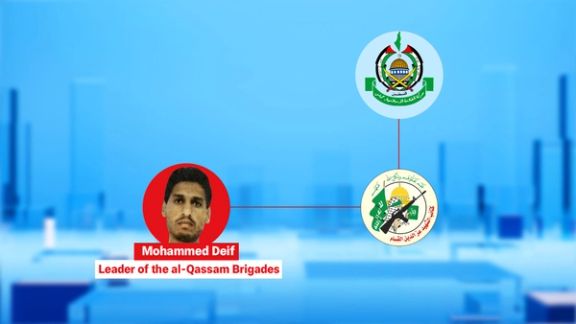
Can Qassam Brigades Be Eradicated?
The Qassam Brigades do not generally disclose the number of their forces, but this number is estimated to be between twenty to thirty thousand troops. This is more than double the estimate from twenty-three years ago.
A high-ranking Israeli military official reported on 1st December, 56th day of war, that at least 10 out of 24 Hamas battalions have suffered significant damage. Additionally, more than 50 mid-level commanders and an estimated 5,000 fighters are believed to have been killed. It indicates that there is still a long way to go to defeat the Hamas military wing. The intensive phase of the ground offensive is expected to continue into early 2024 as part of a year-long or more campaign planned by Israel against Hamas.
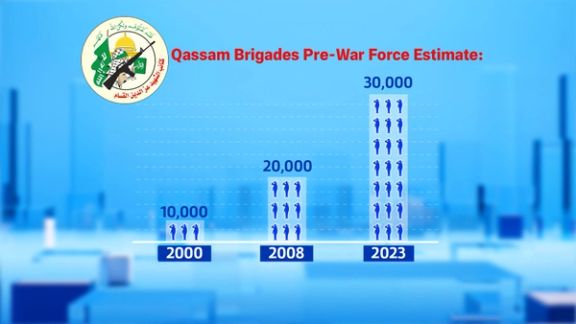
Israel has set its objective to eradicate Hamas, committed to pursuing this goal for as long as necessary. Nonetheless, in the event of successfully neutralizing Hamas and its military wing, there remains no foolproof guarantee that a different hardline faction won't rear its head. The Islamic Republic of Iran and its proxy groups in the region appear keen on providing support, both ideologically and financially, potentially paving the way for the emergence of a new player in the enclave.
To take down the Qassam Brigades, it’s crucial to squeeze their cash flow, especially those from Iran, their primary military supporter. According to Economist, Hamas's financial empire generates over $1 billion annually. $750 million of that $1 billion is believed to come from abroad, according to Israel’s official. This substantial funding is a key factor in sustaining Hamas's current stockpile of arms and resources. The United States estimates that Iran contributes $100 million annually to Palestinian Islamist groups, primarily in the form of military assistance. Israeli officials claim that a minimum of $500 million annually, originates from Hamas's investments, including firms registered in various countries across the Middle East.
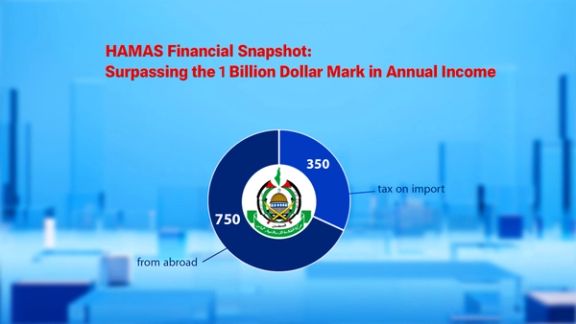
Getting on top of this challenge calls for a worldwide endeavor, intricately connected to both the ideological chessboard and the broader Palestinian puzzle -- a puzzle that has cast a devastating impact on both Israelis and Palestinians alike. As the Book of Proverbs wisely states, "The spirit of a man will sustain his infirmity; but a wounded spirit, who can bear?"
To wipe out the Qassam Brigades and dismantle Hamas for good or prevent the emergence of any other Islamic extremist group, three big challenges need to be tackled: their radical Islamist ideology, the Palestinian issue, andthe funding sustaining such entities. Navigating talks on Hamas-like ideological entity needs sharp minds, especially to figure out what the Islamic Republic of Iran's up to.
Even if Israel manages to get rid of Hamas, sorting out the Palestine problem means shaking up the peace talks and giving the two-state solution a fresh spin. Plus, putting a stop to Hamas's military wing needs a global effort, especially trimming their cash flow from Iran and Qatar. Post-Hamas, maintaining vigilant oversight is crucial to ensure Iran and its allies don't stir up any radical trouble, making sure that any peace process stays on track.

The Baha'i International Community (BIC) has issued a statement accusing Iran of employing brutal tactics to persecute the country's Baha'i religious minority.
Released on Monday, the statement sheds light on the government's systematic efforts to strip Baha'is of their "sense of peace and security in their daily lives."
The disturbing methods employed by authorities include violent home raids, a surge in Baha'is in prison and awaiting summons, punitive property confiscations, denial of burial rights, obstruction of higher education, and a surge in official hate speech against the community.
Simin Fahandej, BIC Representative to the United Nations in Geneva, expressed deep concern, stating, "The growing volume of attacks on Iran’s Baha’is, which we have observed for over a year, is exceeded only by the brutality of the new tactics that the Iranian government is bringing to bear against the innocent Baha’i community."
The statement outlines a strategy by the Iranian government to terrorize vulnerable Baha'is, who already face extreme pressures for their faith, aiming to demoralize not only the Baha'i community but all of Iranian society. The international community is urged to insist on an immediate halt to the oppressive policies.
Since October, 40 Baha'is have been arrested, and the homes of nearly 100 families have been invaded and searched across cities. Approximately 70 Baha'is are in detention or serving prison terms, subjected to psychological and physical abuse during interrogations, while 1,200 others are entangled in ongoing trials or awaiting prison summonses.
Unofficial sources estimate over 300,000 Baha'i citizens reside in Iran, yet the Constitution officially recognizes only Islam, Christianity, Judaism, and Zoroastrianism, making Baha'is the largest non-Muslim religious minority, systematically targeted since the 1979 revolution.
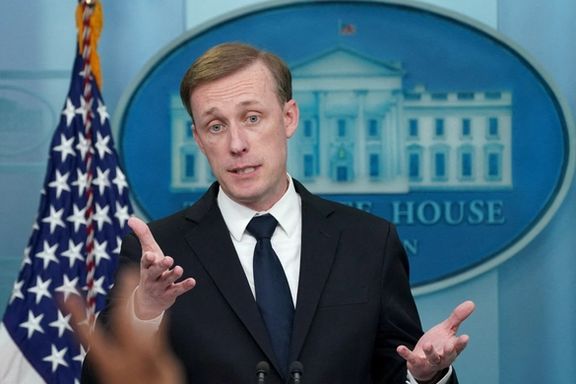
The US government’s reaction to attacks on vessels in the Red Sea on Sunday has been a mixture of blaming Iran and downplaying the threat to the US Navy.
The episode began when three commercial vessels came under attack from Iran-backed Houthis on Sunday. USS Carney responded to the vessels’ distress calls and shot down three drones. It too got targeted, according to some Pentagon reports. But later the Pentagon claimed they were not sure if US warships are being targeted by the Houthis.
However, in a presser Monday afternoon, national security advisor Jake Sullivan pointed the finger at Iran.
“We have every reason to believe these attacks, while they were launched by the Houthis in Yemen, are fully enabled by Iran,” he said, reiterating an earlier statement from Centcom.
Sullivan added that talks are being held with US allies to set up “a maritime task force of sorts” to ensure safe passage for ships in the Red Sea.
The Biden administration has been trying hard to avoid direct confrontation with Iran –and a potential escalation of war in the region. But continued targeting of American troops and interests is making this strategy untenable.
Lara Seligman of Politico tweeted that “An hours-long firefight involving U.S. commercial vessels in the Red Sea this weekend has left some U.S. officials frustrated by what they see as the Biden administration’s deliberate downplaying of a major threat to American forces.”
Middle East expert Charles Lister also tweeted, “Two DOD sources told me today that the Biden White House has placed (in the words of one) ‘every possible handcuff’ on DOD’s ability to respond to Iran proxy attacks.”
We do need to be more aggressive and push back against Iran,” said Senator Joni Ernst Monday. “This would continue to escalate if we have such a milk-toast response from this administration.”
Biden critics say his approach has emboldened Iran and its proxies. On the Capitol, some call his strategy “appeasement” and are pushing for tougher actions.
“What is it going to take for the Biden administration to take action to stop Iran,” asked Congressman Mike Waltz in an interview with Fox News Monday. “Our sailors under direct fire from Iranian-made missiles & drones deserve better.”
In the past few weeks, the Houthis have attacked several vessels in the Red Sea and launched drones and missiles towards Israel. But they had avoided targeting the Americans – until last weekend.
The more recent wave of Houthi attacks can thus be read as a clear escalation, which could make it harder for Biden and his team to shrug off the role of the regime in Tehran as well as the link to the war on Gaza.
Despite clear messaging from the Houthis in Yemen, both the US and Israel seem to prefer to portray the Red Sea debacle as a separate issue unrelated to Israel's attacks in Gaza. Yet neither have ruled out the possibility of a military response to Houthi attacks.
“If we make the assessment or feel the need to respond, we will always make that decision at a time or place of our choosing,” a Pentagon official was quoted as saying by Politico.
The US has struck back at Iran proxies in Iraq and Syria several times in recent weeks. On Sunday, a US drone killed five militants in Iraq, whom, according to the Pentagon, were preparing to “launch a one-way attack drone.”
Monday afternoon, Centcom published another statement detailing yet another rocket attack on a US base in Syria on the weekend. “There were no injuries to personnel or damage to equipment,” the statement said, confirming that 15 rockets had been fired from “a fuel truck modified to launch up to 20 rockets” in Iraq.
Addressing the ongoing attacks by Iran proxies on American troops across the Middle East, Senator Pete Ricketts blamed the Biden administration and reiterated what seems to be a growing consensus in Washington. “The only thing they understand is strength,” he said. “And when we project weakness like we are, we’re only encouraging them to continue to attack us.”